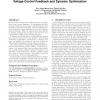4 search results - page 1 / 1 » Minimizing Power Dissipation in Non-Zero Skew-Based Clock Di... |
70
Voted
ISCAS
1995
IEEE
15 years 5 months ago
1995
IEEE
109
click to vote
DATE
2006
IEEE
15 years 8 months ago
2006
IEEE
—The clock distribution network is a key component of any synchronous VLSI design. High power dissipation and pressure volume temperature-induced variations in clock skew have st...
114
click to vote
INTEGRATION
2007
15 years 1 months ago
2007
The optimum wire shape to produce the minimum signal propagation delay across an RLC line is shown to exhibit a general exponential form. The line inductance makes exponential tap...
119
click to vote
ISLPED
2004
ACM
15 years 7 months ago
2004
ACM
Microprocessor designers use techniques such as clock gating to reduce power dissipation. An unfortunate side-effect of these techniques is the processor current fluctuations th...

